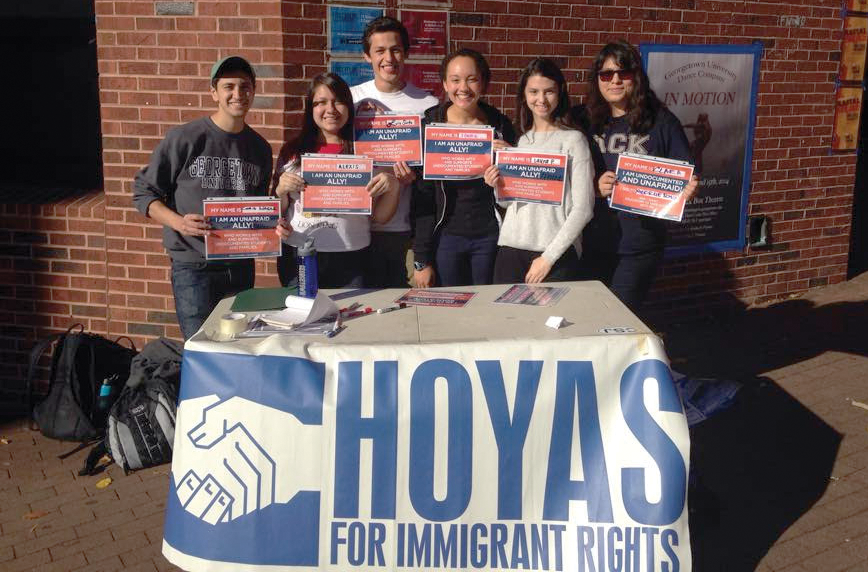
Following advocacy by groups such as Hoyas for Immigrant Rights, the university has launched a website for undocumented students.
Georgetown University announced the launch of the Undocumented Student Resource website — an online portal meant to provide information and resources for undocumented current and prospective Georgetown students — in a campus-wide email from Vice President for Student Affairs Todd Olson on Thursday.
The announcement arrived on the same day as National Institutions Coming Out Day for undocumented students. The annual celebration, created by the United We Dream Network in 2015, recognizes higher education’s commitment to students under undocumented status.
In his email, Olson cited Georgetown’s responsibility as a Jesuit institution to welcome undocumented students and to recognize the challenges they face across the country.
According to Olson’s email, approximately 65,000 students born abroad who are not U.S. citizens or legal residents graduate from U.S. high schools annually, and it is Georgetown’s responsibility to support all students in the spirit of growing globalization.
“I’m writing today to express the university’s support for undocumented students in our Georgetown community,” Olson wrote in an email to students. “As a Catholic and Jesuit institution, we have a unique responsibility to welcome and support all of our students, regardless of immigration status.”
The website includes resources relating to admissions, financial aid, legal aid and advising available to both campus members and prospective students. It also highlights various initiatives on campus meant to serve undocumented students, including student organizations such as Hoyas for Immigrant Rights and the Georgetown Solidarity Committee, along with campus resources such as the Multicultural Equity and Access Center and the Georgetown Scholarship Program.
The website’s creation comes after a history of support for undocumented students by University President John J. DeGioia, who has sent letters in support of the Development, Relief and Education for Alien Minors Act and has encouraged Catholic members of the House of Representatives to pass immigration reform rooted in a path to citizenship.
University administrators and members from UndocuHoyas, a student group dedicated to advancing the issues and voices of undocumented students, formed a working group in June 2015 after activism from UndocuHoyas and collaboration with administrators, including Olson and Associate Dean of Students Dennis Williams.
Members of the working group included various deans, admissions officers, financial aid officials, members from campus ministry and undocumented students. The group first sought to address the lack of a centralized resource for undocumented students by developing a website.
For UndocuHoyas member and undocumented student Clara Mejia (COL ’16), the consolidation of resources into a single website reflects over two years of work. She attributes much of the progress to the activism and efforts from UndocuHoyas to expose the community to the experiences of those with undocumented status.
“UndocuHoyas was leading the conversation since the beginning. We were activists first, then we were students,” Mejia said. “It was us going to offices and talking to the administration and saying ‘Hey, this is my story and this is how I need to be supported.’ We are students and we are sharing our struggles and narratives at Georgetown, and they really showed they cared.”
Mejia hopes many members of the community, from undocumented students to undocumented allies, will appreciate the work done by the working group and hopes the administration is recognized for its accomplishment and progress over the course of the past few years.
“We’ve come a very long way since five years ago, where there wasn’t anything to just having so much happen in the past two years,” Mejia said. “There should be a recognition from a place of pride, that Georgetown actually came out as an institution to support undocumented students. It’s a huge deal nationally.”
While the website’s implementation reflects a significant achievement for those seeking greater resources for undocumented students, Mejia said there is still a need for advocacy from all sides of the community. She said she hopes the website’s visibility and existence will spur increased awareness for those seeking more resources specific to their own situation.
“The job is never done and there are still ways to advocate. We want both undocumented students to come here and also have the resources they need to find success. The website is there but now we have to increase visibility and get it out there. We have to tell people Georgetown is an ‘undocu-friendly’ institution and we have to pride ourselves in that,” Mejia said.
Adisha Kashikar (COL ’16) said the university’s initiative represents welcome progress and needed change, adding that she hopes the awareness it raises will encourage student support and further increase available resources.
“Above everything, what it will do is raise awareness more,” Kashikar said. “Besides helping undocumented students, the rest of Georgetown will understand more about others’ reactions, others’ experiences. I think they should do this more, because it’s good for the school to know more and want to know more about these students.”
Junjie Chen (GRD ’16) said she sympathizes with the situation of those with undocumented status and expects the new initiative to make such students feel more welcomed in the community.
“As an international student, I feel really empathetic and also feel very positive about these resources that the university provides for them,” Chen said. “[Undocumented students] may not be as comfortable identifying their status, believing their status might detriment their future careers, and this might be a step forward in making them more comfortable and feel less like they have to hide.”




















